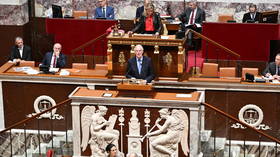French parliament votes no confidence in Macron’s PM

French Prime Minister Michel Barnier has lost a no-confidence vote in parliament, as lawmakers on both the left and the right united to oust him.
A no-confidence motion requires 288 votes in the National Assembly. Wednesday evening’s motion received 331 votes, with the left-wing New Popular Front (NPF) and the right-wing National Rally (RN) uniting in opposition to the minority cabinet imposed by President Emmanuel Macron.
“I don’t consider it a victory,” RN’s Marine Le Pen told TF1 after the vote. “We made the choice we made to protect the French people.”
“It was not done lightly,” Le Pen added. “There was no other solution.”
Jean-Luc Melenchon, the leader of NPF’s largest party, said that the outcome was “inevitable” and called for Macron’s resignation.
“Even with a Barnier every three months, Macron will not last three years,” he said on X. The French president has ruled out resigning, however.
Macron appointed Barnier in September, drawing the ire of NPF. The left-wing coalition had won the most seats in the parliament in this summer’s snap elections, as part of a pact with the president to sideline RN. But Macron then turned around and snubbed NPF in favor of a minority cabinet that relied on the tacit support of RN.
Things came to a head over the social security budget proposal, in which Barnier tried to cut spending by €40 billion ($41.87 billion) and to raise €20 billion in taxes to deal with a massive deficit. RN threatened a no-confidence vote unless the cabinet made a number of concessions to its “red lines.”
Le Pen accused the prime minister of being “extremely closed-minded and sectarian” in the budget talks and gave Barnier a deadline to meet RN’s demands, which Budget Minister Laurent Saint-Martin rejected.
There have been almost 150 no-confidence motions since the Fifth Republic was established in 1958. Prior to Wednesday, only one government had ever been ousted – Georges Pompidou’s, in October 1962.
Barnier is likely to stay on as a caretaker PM until Macron can appoint a replacement. It took the French president nearly two months to do so after July’s parliamentary election. Another vote is not an option, because the French constitution forbids it until at least a year has passed.












